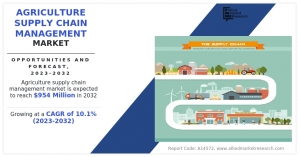Agriculture Supply Chain Management Market Size, Share, Competitive Landscape and Trend Analysis : Global Opportunity Analysis and Industry Forecast, 2023-2032
PORTLAND, PROVINCE: OREGAON, UNITED STATES, June 10, 2024 /EINPresswire.com/ — According to a new report published by Allied Market Research, titled, “Agriculture Supply Chain Management Market,” The agriculture supply chain management market size was valued at $358.62 million in 2022, and is estimated to reach $954 million by 2032, growing at a CAGR of 10.1% from 2023 to 2032.
The agriculture supply chain management comprises agri-based organizations, responsible for the production and distribution of vegetable/fruits/cereals/pulses or animal-based products. The typical agriculture supply chain management involves three steps, such as from farmers to intermediate silos, from silos to transformation plants, and from transformation plants to clients. However, the supply chain for different agricultural products is full of challenges, such as smallholders/marginal dominance of farmers, supply chain fragmentation, lack of economies of scale, low processing/value-added levels, and insufficient marketing infrastructure. However, the use of upcoming technologies, such as blockchain can solve the challenges in agriculture supply chain management, thus improving the overall efficiency. Also, software vendors are collaborating with RFID providers to provide integrated solutions to increase operational efficiency by reducing manual inputs and broadcasting signal information, which leads to adoption of transportation management software (TMS) in agriculture supply chain management.
In addition, the agriculture supply chain management market has witnessed significant growth in recent years, owing to increased demand for agricultural products and innovative agricultural techniques among producers. Furthermore, the companies operating in the market have adopted partnerships, investments, and product launches to increase their market share and expand their geographical presence. For instance, in June 2021, Geora Ltd. announced collaboration with AgriDigital, a developer of software solutions for agricultural supply chains, to develop and integrate blockchain technologies into its products. This helped create the tools to empower farmers to manage finances and efficiently track the supply chain variables.
– https://www.alliedmarketresearch.com/request-sample/A14572
Similarly, in October 2021, FCE GROUP AG announced a partnership with Synergos-Nigeria, a non-profit organization working to bring improvements to smallholder farmers. The partnership worked to improve the agricultural produce in Kaduna State of northwest Nigeria. The project saw around 450,000 farmers receiving digital tools and access to a cloud platform for digital identification, supply chain traceability, and a payment system with traditional and alternative payment methods to transform agricultural practices, improve living conditions, and increase the food security in Nigeria. Apart from this, it offers several advantages to agri-based organizations for faster deployment, minimal risk, greater flexibility, increased visibility, and others, which are positively impacting on the market growth.
Factors such as increase in need for demand management solutions among agri-business organizations, increase in use of cloud-based SCM software, and surge in need for improved supply chain visibility supplement the growth of the agriculture supply chain management market. However, high cost associated with the implementation and maintenance of supply chain management (SCM) solution and uncertainty in regulations and lack of standards are the factors expected to hamper the growth of the market. In addition, rise in urbanization and globalization and integration of blockchain technology in agriculture supply chain management create market opportunities for the key players operating in the market.
– https://www.alliedmarketresearch.com/agriculture-supply-chain-management-market/purchase-options
–
The COVID-19 outbreak severely impacted the global agriculture supply chain management market adversely. It has caused disruptions in the agricultural supply chain due to a lack of supplies from other states, issues in the arrangement of the transport vehicles, transportation restrictions, labor shortage, inefficient cold chain facilities, panic buying, fluctuation in prices, and lack of collectors/aggregators in the market. Furthermore, the pandemic has affected the global export and import of agricultural products because of global trade restrictions. All these activities have negatively affected the global agriculture supply chain management. However, the players in the market are taking the required steps to overcome the loss incurred because of the pandemic. Moreover, it is anticipated that during post-pandemic the companies will focus more on solutions that will support advanced planning and mitigate the impact of similar events in the future. The companies will focus more on end-to-end stock visibility, complex supplier monitoring, and process automation; thus, boosting the demand for SCM software in the agriculture supply chain management industry in upcoming years.
– https://www.alliedmarketresearch.com/purchase-enquiry/A14572
By component, the service segment dominated the global agriculture SCM market in terms of growth rate, in the year 203By solution type, the market intelligence segment dominated the global agriculture SCM market in terms of growth rate in the year 2032.
By deployment model, the on-premise segment dominated the global agriculture SCM market market in terms of growth rate in the year 2032.
:
Chainpoint, Proagrica, IBM, SAP, Agri Value Chain, AirDAO, BEXT360, FCE Group AG, Intellync, EKA, KPMG, Geora Ltd, Grainchain, Inc., BlueCircle, Sustainable Agriculture Initiative Platform (SAI Platform), AgriDigital, Vesatogo Innovations Pvt. Ltd.
David Correa
Allied Market Research
+ 18007925285
email us here
Visit us on social media:
Facebook
Twitter
![]()





